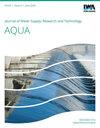配水管网泵阀实时调度的多智能体强化学习框架
IF 4.3
Q2 Environmental Science
引用次数: 0
摘要
随着能源和水资源的短缺,配水网络的能源和水资源管理变得越来越重要。然而,在动态环境中实现泵和阀的实时调度仍然是一个挑战。因此,本研究提出了一个多智能体强化学习调度框架来解决用水需求的不确定性。首先,我们构建了一个WDN环境,并将调度问题建模为马尔可夫决策过程。其次,采用多智能体深度确定性策略梯度(madpg)方法确定多智能体完全合作任务的策略。此外,还探讨了能量损失和水损失对调度策略的影响。最后,将结果与遗传算法(GA)、粒子群优化(PSO)和差分进化(DE)的结果进行比较,以验证所提模型的性能和鲁棒性。研究结果表明,水损失在调度过程中占主导地位,而最小化水损失和能源成本的调度方案主要受消费者需求模式的影响,而不是受能源电价的影响。所提出的madpg模型优于GA、PSO和DE模型,求解速度明显加快,有利于实际应用。本文章由计算机程序翻译,如有差异,请以英文原文为准。
Multi-agent reinforcement learning framework for real-time scheduling of pump and valve in water distribution networks
With energy and water resources shortages, the energy and water resources managements of water distribution networks (WDNs) have become increasingly important. However, achieving real-time scheduling of pump and valve in dynamic environments remains challenging. Thus, this study proposes a multi-agent reinforcement learning scheduling framework to address the uncertainty of water demand in WDNs. First, we constructed a WDN environment and modelled the scheduling problem as a Markov decision process. Second, a multi-agent deep deterministic policy gradient (MADDPG) method was used to determine the strategy of the fully cooperative multi-agent task. Moreover, the impacts of energy and water loss costs on the scheduling strategy were explored. Finally, the results were compared with those of a genetic algorithm (GA), particle swarm optimisation (PSO), and differential evolution (DE) to verify the performance and robustness of the proposed model. The results show that water loss dominates the scheduling process, and the scheduling solutions for minimising water loss and energy costs are mainly affected by the demand pattern of consumers rather than the energy tariff. The proposed MADDPG model outperforms the GA, PSO, and DE models, achieving a significantly faster solution, which is advantageous for practical applications.
求助全文
通过发布文献求助,成功后即可免费获取论文全文。
去求助
来源期刊
CiteScore
4.70
自引率
0.00%
发文量
74
审稿时长
4.5 months
期刊介绍:
Journal of Water Supply: Research and Technology - Aqua publishes peer-reviewed scientific & technical, review, and practical/ operational papers dealing with research and development in water supply technology and management, including economics, training and public relations on a national and international level.

 求助内容:
求助内容: 应助结果提醒方式:
应助结果提醒方式:


